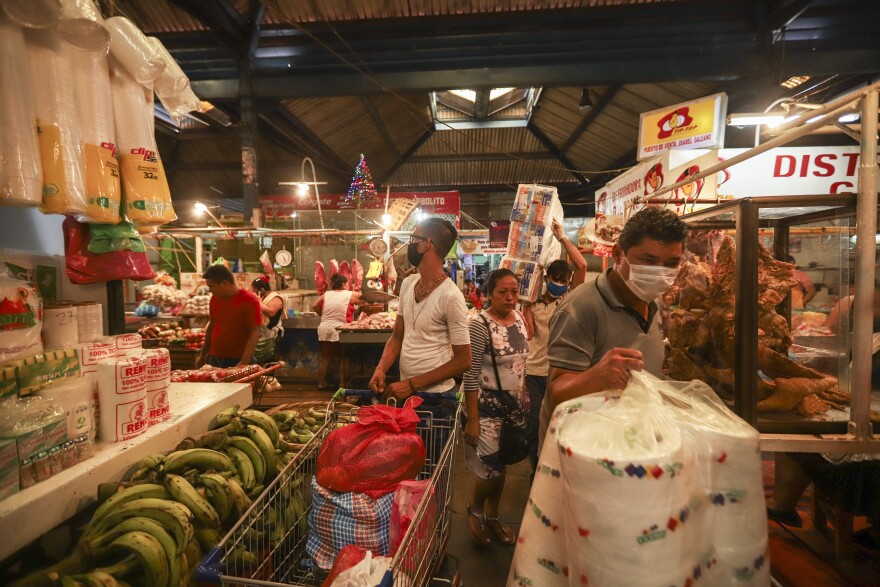Since the statewide self-quarantine began, César Argüello has not only been thinking about how to protect himself from the coronavirus and meet his academic responsibilities but also about what might happen in Nicaragua—his home country. The 20-year-old is a second-year physics and computer science student at the University of Florida, but his entire family and friends remain where he left them four months ago: Managua, the capital city of his home country.
"At first, I decided to stay in Gainesville because I was afraid that the situation in Nicaragua would get worse, and I wouldn’t be able to come back for summer, as I was planning on taking in-person classes during that time," Argüello said.
Although UF recently announced that summer classes will be held online, and César said that he would like to travel to see his family and friends, but he still feels unsure about making the trip.
"In the country, we don’t have access to information and we don’t really know at what level of the pandemic we are already," he said.
The government authorities of Nicaragua reported a total of only nine positive COVID-19 cases, one deceased person and 12 people with possible symptoms under surveillance. Amid the pandemic, the Ministry of Health, which is the only testing regulator for COVID-19 in Nicaragua, refrains from sharing the number of people it has tested. However, the organization insists that all the positive cases have been imported and that there is no community transmission.
Jorge Iván Miranda, a pneumologist who graduated from the National Autonomous University of Mexico and is an active member of the Nicaraguan Association of Pneumology, said that in Nicaragua people will not know when they move from one phase of the pandemic to another because not enough testing is being done.
Miranda is concerned that the Nicaraguan healthcare system could collapse due to a high number of patients in very little time and that medical personnel do not have the proper supplies to protect themselves as they treat sick patients. He said he estimates, according to a personal count, that Nicaragua has 288 beds for intensive care and 233 ventilators nationwide, including both public and private hospitals.
The lack of resources in Nicaragua is alarming because projections, such as the one from Imperial College School of Medicine in London, estimate that if no social distancing or mitigation measures are implemented in the country, in one year 91% of the Nicaraguan population — around 5.6 million people — will be infected with COVID-19.
Denisse Flores, a third-year telecommunications student at UF traveled back to Nicaragua three weeks ago to minimize housing and food expenses and avoid being alone in Gainesville.
Since she arrived in her home country, she has been taking proper social distancing measures, especially since her 94-year-old grandmother lives with her family, for whom getting coronavirus could be fatal. Flores has been following the World Health Organization's safety recommendations and feels that she is decently protected from the virus, however, she said she is very afraid for her fellow Nicaraguan citizens.
"I went to run some errands with my mom. We didn’t step out of the car at all, but when we went to Masaya (one of the neighboring departments of the capital), we were both worried to see all the buses full of people not wearing masks or practicing social distancing," Flores said.
In Nicaragua, the government has not taken measures to prevent the spread of the pandemic. It alleged that declaring self-isolation is an "extremist and alarming" measure. Instead of following WHO's recommendations, the government is promoting the opposite of social distancing, by encouraging public gatherings like fairs, carnivals, concerts, marches and marathons. Classes have not been suspended or moved online and the country's borders remain completely open.
Nicaragua's President, Daniel Ortega, has not addressed the pandemic and has been absent from the public's view for 30 days. His absence has led to speculations ranging from severe illness to being in quarantine himself.
On April 6, the Central American Bank for Economic Integration provided 26,000 COVID-19 rapid test kits to Nicaragua. However, government authorities have not yet informed how or when they will be used.
The Pan American Health Organization questioned Nicaragua’s response to the pandemic. "We have concerns for the lack of social distancing, the convening of mass gatherings," said Carissa Etienne, director of the organization. "We have concerns about the testing, contact tracing, the reporting of cases. We also have concerns about what we see as inadequate infection prevention and control."
The Nicaraguan government's public announcements generate more doubts than answers, and Miranda said that it's thanks to the prevention campaigns of different media and organizations, the population has acted consciously and taken precautions on their own.
Miranda recommends that people stay home as much as possible because social distancing, in addition to frequent hand washing and disinfecting of high-contact surfaces, such as desks, computers and phones, is the best measure to avoid contagion. He also recommends avoiding crowds and suggests that people get vaccinated, especially against influenza and pneumococcal. Although the vaccinates do not protect against COVID-19, they do avoid other infections that could weaken people’s immune systems.
"Really dark days are coming if this continues," Flores said. She said that regardless of the uncertainty, she’s looking forward to starting her last year at UF this August.
Editor's Note: A previous version of this story stated on April 13, the Nicaraguan government had 10 positive cases of COVID-19 and four showing symptoms.

